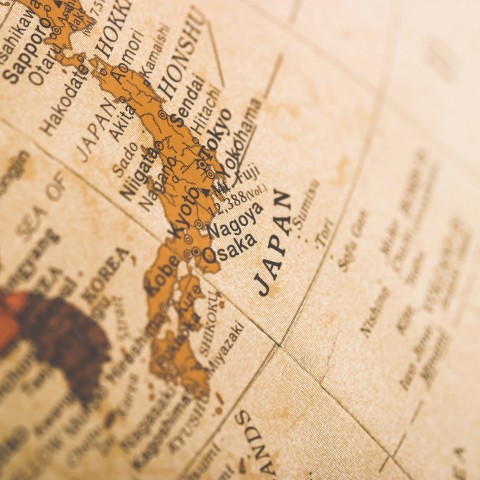
The Japanese language can be very difficult for English speakers to learn as these two languages are completely different in every aspect: origin, writing system, grammar, and phonetics. But when it comes to vocabulary, you may be surprised to hear that this isn’t really the case. There are actually quite a few English loanwords in Japanese!
There’s even a name for the mixing of these two languages: Japanglish.
Some of the English words used in Japanese have the same meaning as the original ones, while others have been localized and modified (often shortened), combined with Japanese words, and/or used with a completely different meaning.
In this article, we’ll introduce English words that are commonly used in Japanese. Although you may find some of them very weird, learning Japanglish is one of the easiest parts of learning Japanese and it will be helpful in your language studies.

There is a lot of Japanglish vocabulary used in Japan.
 Table of Contents
Table of Contents
- Introduction to Japanglish
- Typical English Loanwords in Japanese
- Japanglish Wasei Eigo
- How to Say These Names in Japanese
- English Words Borrowed From Japanese
- How JapanesePod101 Can Help You Learn More Japanese
1. Introduction to Japanglish
There are two types of English words used in the Japanese language: loanwords and Wasei-Eigo. Let’s take a closer look at each group.
Loanwords Used in Japanese
Loanwords, or 外来語 (gairai-go), are commonly used in modern Japanese. After two centuries of isolation, called 鎖国 (Sakoku), Japan became “open” to foreign countries in the mid-nineteenth century. This new status brought with it influences from Western cultures, and many of the first loanwords in Japan came from Portuguese, Dutch, French, and German. English loanwords started to gain prevalence during the post-World War II period. Since then, Japanglish has continued to evolve and grow in popularity.
While the younger Japanese generations often use loanwords without even realizing they’re originally from foreign languages, the older population hardly uses or understands them.
The most basic loanwords are English words used in Japanese with the same meaning, but with Japanese pronunciation. Examples include:
- カメラ (kamera) – “camera”
- タクシー (takushī) – “taxi”
- クリック (kurikku) – “click”
You have to keep in mind that loanwords are normally written with カタカナ (Katakana) letters and follow Japanese pronunciation rules. Also, when they’re written in alphabet form using ローマ字 (Roma-ji), or the romanization of Japanese, the spelling is often different from that of the original English words. This is because they’re transcribed according to how the Japanese read and pronounce words.
For example, all of the consonants in Japanese end with a vowel (あ a, い i, う u, え e, お o). In addition, since there’s no particular distinction between L and R in Japanese, all of the “L” sounds in English are expressed using “R” in Japanese. Thus, “click” is expressed as kurikku in Japanese.
To learn more about Japanese pronunciation, please see our “Japanese Pronunciation” article!

カタカナ (Katakana) characters are used to write loanwords.
Japanglish Wasei-Eigo: English Made in Japan
There are also English words used in Japanese that have been more fully integrated into the language. These are called 和製英語 (Wasei Eigo), or literally, “English made in Japan.”
Wasei Eigo refers to English words adopted into Japanese with unique meanings, word combinations, and/or abbreviations only used in Japan. Examples include:
- サラリーマン (sararīman)
- from “salaryman,” meaning “businessman who works at a company and gets a monthly salary”
- シャーペン (shāpen)
- short for “sharp pencil,” meaning “mechanical pencil”

サラリーマン (sararīman), or “salaryman” meaning “businessman,” is one of the most typical Japanglish words.
2. Typical English Loanwords in Japanese
These loanwords have the same meaning as their English counterparts and are commonly used in daily Japanese conversations.
| Loanword | Roma-ji / Reading | English Word |
| グラス | gurasu | glass |
| スプーン | supūn | spoon |
| フォーク | fōku | fork |
| ナイフ | naifu | knife |
| ビール | bīru | beer |
| ワイン | wain | wine |
| バス | basu | bus |
| バイク | baiku | (motor) bike |
| コンピューター | conpyūtā | computer |
| インターネット | intānetto | internet |
| ウェブサイト | webusaito | website |
| ホテル | hoteru | hotel |
| レストラン | resutoran | restaurant |
| テーブル | tēburu | table |
| サービス | sābisu | service |
| エレベーター | erebētā | elevator |
| ドア | doa | door |
| サイズ | saizu | size |
| シャツ | shatsu | shirt |
| ネクタイ | nekutai | necktie |
| サンダル | sandaru | sandal |
| サングラス | sangurasu | sunglasses |
| テスト | tesuto | test |

Words that are associated with Western-style restaurants are often used as loanwords in Japanese. These include レストラン (resutoran) – “restaurant” / ナイフ (naifu) – “knife” /ワイン (wain) – “wine.”
3. Japanglish Wasei Eigo
Learning Wasei-Eigo may be a bit more difficult, as these words and phrases have undergone alterations during their journey into the Japanese language. In this section, we’ll give you several Japanglish examples and explain them in more detail as needed.
English Words Used With Different Meanings
| Wasei Eigo | Roma-ji / Reading | English Word | Meaning |
| マンション | manshon | mansion | apartment (bigger building than アパート) |
| アパート | apāto | apart | apartment (smaller building than マンション) |
| コンセント | consento | consent | electrical outlet Many Japanese people use the word “consent” to mean “electrical outlet.” It is said that it originates from the word “concentric plug.” |
| メイク | meiku | make | makeup |
| リンス | rinsu | rinse | hair conditioner |
| アイス | aisu | ice | ice cream |
| ホットケーキ | hotto kēki | hot cake | pancake |
| スーパー | sūpā | super | supermarket |
| レジ | reji | register | It originally comes from “cash register,” meaning “checkout counter” or “cashier.” |
| ファイト! | faito! | fight | This word is used to cheer someone up. It can mean “Hang in there,” “You can do it,” or “Do your best.” |
| ハイテンション | hai tenshon | high tension | very excited / hyper |
| テキスト | tekisuto | text | textbook / school manual |
| カンニング | kanningu | cunning | cheating on an exam |
| タレント | tarento | talent | television personality / entertainer |
Examples
- 次の試合は必ず勝つよ!ファイト!
Tsugi no shiai wa kanarazu katsu yo! Faito!
“You will definitely win the next match! Do your best!”
- 彼は昨日なぜかとてもハイテンションでした。
Kare wa kinō naze ka totemo hai tenshon deshita.
“He was very excited yesterday for some reason.”
- あなたの一番好きなタレントは誰ですか。
Anata no ichi-ban suki na tarento wa dare desu ka.
“Who is your most favorite TV personality?”

ホットケーキ (hotto kēki), or “hot cake,” means “pancake” in Japan.
Abbreviated Word Combinations
In Japanese, it’s common for two or more English words to be shortened into one word (usually with four syllables). Let’s see some examples.
| Wasei Eigo | Roma-ji / Reading | English Word | Meaning / Description |
| リモコン | rimokon | remote controller | remote controller In Japanese, the first syllables from each word are combined. |
| マスコミ | masukomi | mass communication | mass communication / mass media / the press / journalism |
| エアコン/ クーラー | eakon / kūrā | air conditioner / cooler | air conditioner クーラー (kūrā), or “cooler,” is also commonly used to mean “air conditioner.” |
| パソコン | pasokon | personal computer | computer Along with コンピューター (conpyūtā), パソコン (pasokon) is also commonly used when talking about computers. |
| コンビニ | konbini | convenience store | This word refers to convenience stores that are open 24 hours a day and seen everywhere throughout Japan. |
| イメチェン | imechen | image change | This refers to changing one’s image, especially in terms of one’s hairstyle or clothing. |
| OL (オーエル) | ōeru | office lady | Similar to “salaryman,” this word refers to a woman who works at an office. This word is also an abbreviation. |
| CM (シーエム) | shīemu | commercial message | commercial This abbreviation is used to mean “commercial” in Japanese. |
| BGM (ビージーエム) | bījīemu | background music | This refers to background music, especially when it’s played in a store, cafe, restaurant, etc. |
Examples
- 昨日私の古いパソコンが壊れました。
Kinō watashi no furui pasokon ga kowaremashita.
“Yesterday, my old computer broke.”
- イメチェンしたいなら髪型を変えるのが一番だよ!
Imechen shitai nara kamigata o kaeru no ga ichi-ban da yo!
“If you want to change your image, it’s best to change your hairstyle!”
- あのカフェのBGMはジャズがかかっていておしゃれです。
Ano kafe no bījīemu wa jazu ga kakatte ite oshare desu.
“That cafe plays jazz as background music and it’s fashionable.”

リモコン (rimokon) is an abbreviation of “remote controller.”
Words That Combine English and Japanese
Wasei Eigo can also get creative, with some words being a combination of an English loanword and a Japanese word.
| Wasei Eigo | Roma-ji / Reading | Composition of Words | Meaning |
| 省エネ | shōene | 省 (Kanji that represents “save”) + energy | energy-saving |
| 軽トラ | keitora | 軽 (Kanji that represents “light”) + truck | light (engine) truck / small truck |
| ガス欠 | gasuketsu | gas + 欠 (Kanji that represents “lack”) | running out of gasoline (petrol) |
| 懐メロ | natsumero | 懐 (Kanji that represents “nostalgic”) + melody | nostalgic song / all-time favorite song |
| ドタキャン | dotakyan | 土壇場 (dotanba), meaning “last moment” + cancellation | cancellation at the last moment |
| イタ飯 | itameshi | Italian + 飯 (meal/food) | Italian food |
| 猛ダッシュ | mōdasshu | 猛 (Kanji that represents “fierce” / “intense” / “acute”) + dash | sprint / run as fast as one can |
Examples
- 新しい冷蔵庫は省エネモデルです。
Atarashii reizōko wa shōene moderu desu.
“The new refrigerator is an energy-saving model.”
- ガス欠により道の真ん中で車が止まった。
Gasuketsu ni yori michi no mannaka de kuruma ga tomatta.
“The car stopped in the middle of a road due to running out of gasoline.”
- まりこはいつもデートをドタキャンする。
Mariko wa itsumo dēto o dotakyan suru.
“Mariko always cancels a date at the last moment.”
Loanwords Turned Into Japanese Verbs
By adding the Japanese word する (suru), or “to do,” after a loanword (whether it’s a noun or a verb), it becomes a verb in Japanese.
| Wasei Eigo | Roma-ji / Reading | Composition of Words | Meaning |
| ドライブする | doraibu suru | drive + suru | to go for a drive |
| ノックする | nokku suru | knock + suru | to knock |
| キャンセルする | kyanseru suru | cancel + suru | to cancel |
| ジョギングする | jogingu suru | jogging + suru | to jog |
| リラックスする | rirakkusu suru | relax + suru | to relax |
| ジャンプする | janpu suru | jump + suru | to jump |
| キスする | kisu suru | kiss + suru | to kiss |
| メイクする | meiku suru | make + suru | to put on makeup |
| パーティーをする | pātī o suru | party + o + suru | to party |
| ギャンブルする | gyanburu suru | gamble + suru | to gamble |
Examples
- 私はお風呂に入ってリラックスするのが好きです。
Watashi wa o-furo ni haitte rirakkusu suru no ga suki desu.
“I like to take a bath and relax.”
- 私たちは週末に誕生日パーティーをする予定です。
Watashi-tachi wa shūmastu ni tanjōbi pātī o suru yotei desu.
“We plan to have a birthday party over the weekend.”
- 入る前にドアをノックしてください。
Hairu mae ni doa o nokku shite kudasai.
“Please knock on the door before entering.”
To learn all about conjugation in Japanese, please see our article on Japanese Verb Conjugations.

パーティーをする (pātī o suru) – “to party”
4. How to Say These Names in Japanese
In Japan, world-famous brand names are pronounced according to Japanese pronunciation rules and are sometimes called something different. Here are a few examples.
- Google: グーグル (Gūguru)
- Apple: アップル (Appuru)
- Starbucks: スターバックス (Sutābakkusu)
A shortened version, スタバ (Sutaba), is commonly used in daily conversations.
- Kentucky Fried Chicken: ケンタッキー フライド チキン (Kentakkī furaido chikin)
There are also a couple of shortened versions often used in daily conversations: ケンタッキー (Kentakkī) and ケンタ (Kenta).
- McDonald’s: マクドナルド (Makudonarudo)
Depending on the region of Japan, there are different shortened versions for this brand name.- ➢ Kanto (Tokyo, Chiba, Saitama, Kanagawa) and other regions: マック (Makku)
➢ Kansai region (around Osaka, Kyoto, Nara, Hyogo, etc.): マクド (Makudo)

There are even different dialect forms for “McDonald’s” in Japanese!
5. English Words Borrowed From Japanese
Due to globalization, there are also plenty of popular Japanese words in English! Let’s look at a few of these borrowed words:
| Food-Related Words | Kanji / Hiragana | Meaning / Description |
| Sushi | 寿司 / すし | Sushi is a famous Japanese food, consisting of vinegared rice and raw and/or cooked seafood. |
| Teriyaki | 照り焼き / てりやき | Teriyaki is a Japanese cooking technique and flavor. Foods are broiled or grilled with a glaze of sauce made of soy sauce, mirin, and sugar. 照り(teri) refers to a shine/luster and 焼き (yaki) means “grill.” |
| Tofu | 豆腐 / とうふ | Tofu is bean curd made of soybeans. The Japanese word Tofu originates from the Chinese word 豆腐 (dòufu), which literally means 豆 (“bean”) + 腐(“curdled” or “fermented”). |
| Edamame | 枝豆 / えだまめ | Edamame is a dish of immature soybeans, usually boiled and salted. |
| Sake | 酒 / さけ | Sake literally means “alcoholic drink” in Japanese, but it often refers to Japanese rice wine, or 日本酒 (Nihonshu). |
| Matcha | 抹茶 / まっちゃ | Matcha refers to green tea leaves that have been finely ground into a powder. Green tea leaves for Matcha are grown and processed using a specific method. |
| Bento | 弁当 / べんとう | Bento is a reusable lunch box that can contain a single-portion meal, usually consisting of rice and some sides. |
| Culture-Related Words | Kanji / Hiragana | Meaning / Description |
| Bonsai | 盆栽 / ぼんさい | Bonsai is an artform of planting that uses cultivation techniques to produce small trees in containers. Bonsai literally means “tray planting.” |
| Origami | 折り紙 / おりがみ | Origami is the art of folding papers, usually done with square papers that have color on one side and white on the other side. Origami breaks down as: 折り(ori) – “fold” + 紙 (kami/gami) – “paper” |
| Emoji | 絵文字 / えもじ | Emoji is a type of pictograph that is used in electronic messages, originally invented in Japan. Emoji breaks down as: 絵 (e) – “picture” + 文字 (moji) – “character” |
| Manga | 漫画 / まんが | Manga refers to Japanese-style comics that are often animated. |
| Cosplay (Kosupure) | コスプレ | The word コスプレ (Kosupure) comes from “costume play.” It is a type of performance art in which participants (cosplayers) dress up as characters from their favorite manga or anime. |
| Karaoke | カラオケ | Karaoke is a shortened version of 空 (kara), meaning “empty,” and オーケストラ (ōkesutora), meaning “orchestra.” It is a form of entertainment where an amature sings popular songs using a microphone, following along with the instrumental music/melody and lyrics displayed on a video screen. |
| Sudoku | 数独 / すうどく | Sudoku is a logic-based number-placement puzzle. The word 数独 (Sudoku) is an abbreviation that means “number” + “single,” coming from the rule of this puzzle: “the digits must be single” or “the digits are limited to one occurrence.” |
| Other Famous Words | Kanji / Hiragana | Meaning / Description |
| Kaizen | 改善 / かいぜん | 改善 (Kaizen) is literally translated as “improvement.” Kaizen in English often refers to “continuous improvement” in business atmospheres. It became known as the Japanese way of doing business to optimize processes and produce better results. |
| Karoshi | 過労死 / かろうし | 過労死 (Karoshi) literally means “death of overwork.” It refers to death as the result of mental and/or physical illness from working too much or being under too much pressure. |
| Tsunami | 津波 / つなみ | 津波 (Tsunami) literally means “port wave.” It is a series of huge waves, usually in an ocean. A Tsunami can be caused by earthquakes, volcanic eruptions, and other underwater explosions. |
| Typhoon | 台風 / たいふう | A Typhoon is a huge tropical cyclone that can be seen in the Northern Hemisphere, in the region called the Northwestern Pacific Basin. The Japanese word 台風 (taifū) became the English “typhoon.” |

Tsunami (津波) is one of the most famous Japanese words that was adapted into English.
How JapanesePod101 Can Help You Learn More Japanese
In this article, we introduced English words used in Japanese. We covered the history of loanwords in Japan and how Japanglish developed, basic loanwords from English and various types of Wasei Eigo, as well as famous Japanese words in English. While some Japanglish terms sound funny and weird, they are definitely helpful to learn and can help you understand Japanese better!
Did you learn anything new about Japanese today? Are there any important words or terms you know about that we didn’t include? Let us, and your fellow language learners, know in the comments!
If you would like to learn more about the Japanese language and culture, you’ll find a lot more helpful content on JapanesePod101.com. We provide a variety of free lessons to help you improve your Japanese language skills. For example, you can view the following vocabulary lists to learn the very basics of Japanese:
You can also take advantage of our personal one-on-one coaching service, MyTeacher, when you subscribe to a Premium PLUS membership. Your private teacher will help you practice pronunciation and give you personalized feedback and advice to help you improve efficiently.
And there is so much more we have to offer you! Learn Japanese faster and enjoy studying with JapanesePod101.com!










